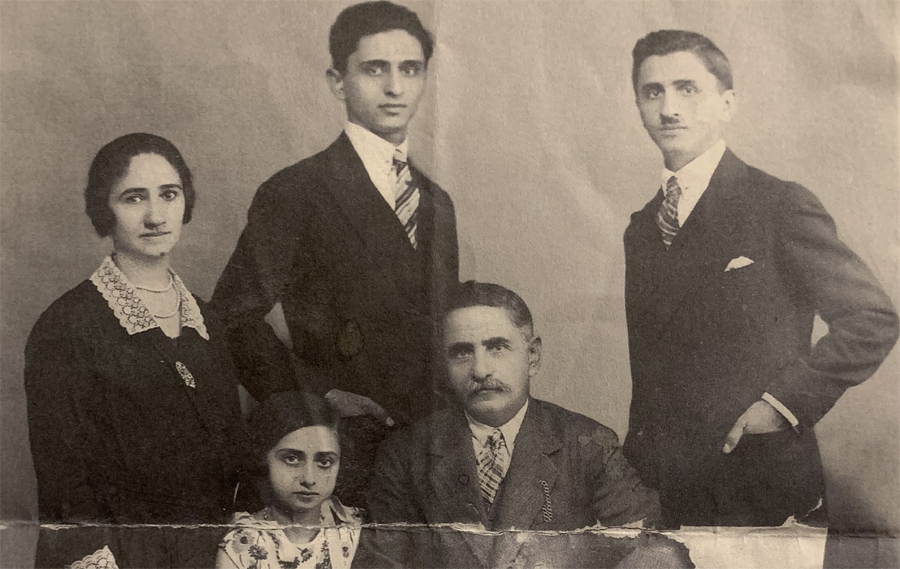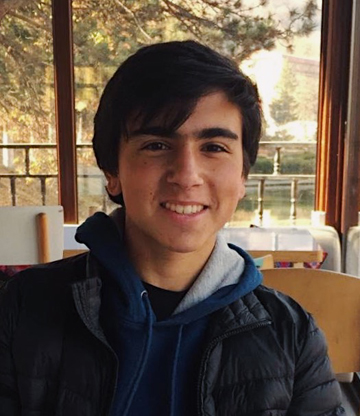The story of UWC Dilijan Canadian-Armenian student Armen and his family
- (0)

“The events of the late 19th and early 20th centuries won’t be forgotten”
Story of UWC Dilijan second-year student Armen, Canadian-Armenian from Montréal, and his family
My parents are diaspora Armenians. My father is Ethiopian-Armenian and my mother is Istanbul-Armenian.
On my father’s side, three brothers from my grandfather’s family escaped to Egypt from Arapgir in the Ottoman Empire (Western Armenia). One of the brothers, Krikor, moved to Ethiopia in 1894 as a tannery specialist. My great grandfather Levon was born in Harrar in 1905. He married Hripsime Kalfayan whose family had escaped from Constantinople (present day Istanbul) in 1915 to save her brothers from military service. Her father was an engineer in a French company in Constantinople, which allowed him to volunteer to go work on the Djibouti – Dire Dawa railroad for the French government.

Armen Erzingatzian
My father’s maternal grandfather Elias Djerrahian’s parents left Cilicia in the Eastern part of the Ottoman Empire in the early 1900s for their safety from the persecution of Armenians by the Ottomans. Their timing was right – within 1 year of their departure in 1908, over 25,000 Armenians of the city of Adana and their environs were massacred. My father’s maternal grandmother Ashkhen Baghdassarian’s father left for Ethiopia in 1898 from Van to join his brother Hagop, a jeweler who minted the first coins for Emperor Menelik.
They migrated to a country with which Armenians had a kinship as Eastern Christians as well as a small presence of trade diasporans. Here they could practice their religion in peace.
On the other hand, my mother’s family was from the heart of the Ottoman Empire, Constantinople. Hundreds of great Armenian intellectuals of that period were arrested in Constantinople on April 24, 1915 and sent into exile and executed. April 24th is symbolically commemorated as the date of the Armenian genocide. The massacres and deportations mostly happened in the Armenian villages in the East of the Ottoman Empire, not in Istanbul, even though Armenian intellectuals were killed or imprisoned there. The Armenians in the city of Istanbul (or Bolis, as the Armenians called it from the original Greek name of Constantinople) knew very little about what was happening to their fellow Armenians in the rest of the Empire. Even in the years following the genocide when my great grandfather was born, little was known about the genocide.
There were two survivors that married into my mother’s parents’ families. One of them was Siranoush Berberian who had changed her last name to Ozgeren because of pressure and fear. She was 4 or 5 when she was taken from her hometown. As my grandmother tells me today, Siranoush was one of the orphans who was helped by a priest or some other religious presence and put on a boat to Lebanon. Siranoush was then brought to Istanbul, where the Armenian community welcomed and adopted her. We don’t know much about her story, as she refused to talk about her past, probably because of the terrible pain it brought her to remember those traumatizing days she experienced at such a young age.
My grandma’s father would never let any of his family members speak or read Turkish in the house, but she never understood why. When she was 20 years old, she went to Baghdad on vacation. There, she read books on the genocide and found out about the terrible things that were done to the Armenians, books that simply could not be found in Istanbul. It was thus at the age of 20 that she found out about the genocide. It affected her greatly as well as her view of Turkey – as a country and as a people. This was when she understood why her father had that important rule, which was to preserve our Armenian language and culture, given that more than a million had died because of their culture and religion, refusing to let go of their beliefs and their identity. She had a relative Hagop who would tell them stories of how his wife had disappeared when he had come back to their village, and that he was forced to walk in the mountains and to find refuge in Istanbul. She realized then what he was talking about – these weren’t just tales, as they had seemed to be.
It was only years later when the younger generation of Istanbul-Armenians began to find out about what had happened in 1915, that the subject was brought up publicly and that books were written and published about it.
Armenians have found homes in all corners of the world, from Argentina to Zambia. They have created strong communities that allow their identity to survive even in the most unlikely of places. They have dreamed of returning to their homeland, to the places that they were named after, such as my surname named after a town in Western Armenia, Erzinga (modern-day Erzincan). They have stayed strong and connected thanks to their love for their identity. The events of the late- nineteenth and early-twentieth centuries will not be forgotten and neither will the survivors of the genocide, nor the language or the culture for which they sacrificed themselves.
Armen Erzingatzian (Canada, UWCD’21)
United World Colleges Dilijan
Armenia


















